Tuesday, January 31, 2006
As US President George W Bush is preparing for his fifth annual State of the Union address, which will focus on Iraq, efforts to restrain Iran's nuclear programme and Hamas' election victory, I suggest that you read this wonderful Q&A guide to understand America's Omnipotent President. Made in USA.
The dream
"I have a dream that one day this nation will rise up and live out the true meaning of its creed - we hold these truths to be self-evident: that all men are created equal.
I have a dream that one day on the red hills of Georgia the sons of former slaves and the sons of former slave-owners will be able to sit down together at a table of brotherhood.
I have a dream that one day even the state of Mississippi, a desert state, sweltering with the heat of injustice and oppression, will be transformed into an oasis of freedom and justice.
I have a dream that my four little children will one day live in a nation where they will not be judged by the color of their skin but by the content of their character.
I have a dream today!
I have a dream that one day, down in Alabama, with its vicious racists, with its governor having his lips dripping with the words of interposition and nullification; one day right there in Alabama little black boys and little black girls will be able to join hands with little white boys and white girls as sisters and brothers.
I have a dream today!
I have a dream that one day every valley shall be exalted, every hill and mountain shall be made low, the rough places will be made plain, and the crooked places will be made straight, and the glory of the Lord shall be revealed, and all flesh shall see it together. "
I have a dream that one day on the red hills of Georgia the sons of former slaves and the sons of former slave-owners will be able to sit down together at a table of brotherhood.
I have a dream that one day even the state of Mississippi, a desert state, sweltering with the heat of injustice and oppression, will be transformed into an oasis of freedom and justice.
I have a dream that my four little children will one day live in a nation where they will not be judged by the color of their skin but by the content of their character.
I have a dream today!
I have a dream that one day, down in Alabama, with its vicious racists, with its governor having his lips dripping with the words of interposition and nullification; one day right there in Alabama little black boys and little black girls will be able to join hands with little white boys and white girls as sisters and brothers.
I have a dream today!
I have a dream that one day every valley shall be exalted, every hill and mountain shall be made low, the rough places will be made plain, and the crooked places will be made straight, and the glory of the Lord shall be revealed, and all flesh shall see it together. "
She had a dream!
 Coretta Scott King was one of the most influential women leaders in our world today. Prepared by her family, education, and personality for a life committed to social justice and peace, she entered the world stage in 1955 as wife of the Reverend Dr. Martin Luther King, Jr. and as a leading participant in the American Civil Rights Movement. Her remarkable partnership with Dr. King resulted not only in four talented children, but in a life devoted to the highest values of human dignity in service to social change. Mrs. King has traveled throughout the world speaking out on behalf of racial and economic justice, women's and children's rights, gay and lesbian dignity, religious freedom, the needs of the poor and homeless, full-employment, health care, educational opportunities, nuclear disarmament and ecological sanity. In her distinguished and productive career, she has lent her support to democracy movements world-wide and served as a consultant to many world leaders, including Nelson Mandela.
Coretta Scott King was one of the most influential women leaders in our world today. Prepared by her family, education, and personality for a life committed to social justice and peace, she entered the world stage in 1955 as wife of the Reverend Dr. Martin Luther King, Jr. and as a leading participant in the American Civil Rights Movement. Her remarkable partnership with Dr. King resulted not only in four talented children, but in a life devoted to the highest values of human dignity in service to social change. Mrs. King has traveled throughout the world speaking out on behalf of racial and economic justice, women's and children's rights, gay and lesbian dignity, religious freedom, the needs of the poor and homeless, full-employment, health care, educational opportunities, nuclear disarmament and ecological sanity. In her distinguished and productive career, she has lent her support to democracy movements world-wide and served as a consultant to many world leaders, including Nelson Mandela.Born and raised in Marion, Alabama, Coretta Scott graduated from Lincoln High School. She received a B.A. in music and education from Antioch College in Yellow Springs, Ohio, and then went on to study concert singing at Boston's New England Conservatory of Music, where she earned a degree in voice and violin. While in Boston she met Martin Luther King, Jr. who was then studying for his doctorate in systematic theology at Boston University. They were married on June 18, 1953, and in September 1954 took up residence in Montgomery, Alabama, with Coretta Scott King assuming the many functions of pastor's wife at Dexter Avenue Baptist Church.
During Dr. King's career, Mrs. King devoted most of her time to raising their four children. From the earliest days, however, she balanced mothering and movement work, speaking before church, civic, college, fraternal and peace groups. She conceived and performed a series of favorably-reviewed Freedom Concerts which combined prose and poetry narration with musical selections and functioned as fundraisers for the Southern Christian Leadership Conference, the direct action organization of which Dr. King served as first president. In 1957, she and Dr. King journeyed to Ghana to mark that country's independence. In 1958, they spent a belated honeymoon in Mexico, where they observed first-hand the immense gulf between extreme wealth and extreme poverty. In 1959, Dr. and Mrs. King spent nearly a month in India on a pilgrimage to disciples and sites associated with Mahatma Gandhi. In 1964, she accompanied him to Oslo, Norway, where he received the Nobel Peace Prize. Even prior to her husband's public stand against the Vietnam War in 1967, Mrs. King functioned as liaison to peace and justice organizations, and as mediator to public officials on behalf of the unheard.
Since her husband's assassination in 1968, Mrs. King has devoted much of her energy and attention to developing programs and building the Atlanta-based Martin Luther King, Jr. Center for Nonviolent Social Change as a living memorial to her husband's life and dream. For 27 years (1968-1995), Mrs. King devoted her life to developing The King Center, the first institution built in memory of an African American leader. As founding President, Chair, and Chief Executive Officer, she dedicated herself to providing local, national and international programs that have trained tens of thousands of people in Dr. King's philosophy and methods; she guided the creation and housing of the largest archives of documents from the Civil Rights Movement; and, perhaps her greatest legacy after establishing The King Center itself, Mrs. King spearheaded the massive educational and lobbying campaign to establish Dr. King's birthday as a national holiday. In 1983, an act of Congress instituted the Martin Luther King, Jr. Federal Holiday Commission, which she chaired for its duration. And in January 1986, Mrs. King oversaw the first legal holiday in honor of her husband--a holiday which has come to be celebrated by millions of people world-wide and, in some form, in over 100 countries.
Coretta Scott King has carried the message of nonviolence and the dream of the beloved community to almost every corner of the globe. She has led goodwill missions to many countries in Africa, Latin America, Europe and Asia. She has spoken at many of history's most massive peace and justice rallies. She served as a Women's Strike for Peace delegate to the seventeen-nation Disarmament Conference in Geneva, Switzerland in 1962. She is the first woman to deliver the class day address at Harvard, and the first woman to preach at a statutory service at St. Paul's Cathedral in London.
A life-long advocate of interracial coalitions, in 1974 Mrs. King formed a broad coalition of over 100 religious, labor, business, civil and women's rights organizations dedicated to a national policy of full employment and equal economic opportunity, as Co-Chair of the Full Employment Action Council. In 1983, she brought together more than 800 human rights organizations to form the Coalition of Conscience, sponsors of the 20th Anniversary March on Washington. In 1987, she helped lead a national Mobilization Against Fear and Intimidation in Forsyth County, Georgia. In 1988, she re-convened the Coalition of Conscience for the 25th anniversary of the March on Washington. In preparation for the Reagan-Gorbachev talks, in 1988 she served as head of the U.S. delegation of Women for a Meaningful Summit in Athens, Greece; and in 1990, as the USSR was redefining itself, Mrs. King was co-convener of the Soviet-American Women's Summit in Washington, DC.
Always close to her family, in 1985 Mrs. King and three of her children were arrested at the South African embassy in Washington, DC, for protesting against apartheid. And, in 1995 she turned over leadership of the Center to her son, Dexter Scott King, who served as Chairman, President & CEO until January 2004. On that date, Mrs. King was named interim Chair and her eldest son Martin Luther King, III assumed the leadership position of President & CEO.
One of the most influential African-American leaders of our time, Mrs. King has received honorary doctorates from over 60 colleges and universities; has authored three books and a nationally-syndicated column; and has served on, and helped found, dozens of organizations, including the Black Leadership Forum, the National Black Coalition for Voter Participation, and the Black Leadership Roundtable.
She has dialogued with heads of state, including prime ministers and presidents; and she has put in time on picket lines with welfare rights mothers. She has met with great spiritual leaders, including Pope John Paul, the Dalai Lama and Bishop Desmond Tutu. She has witnessed the historic handshake between Prime Minister Yitzhak Rabin and Chairman Yassir Arafat at the signing of the Middle East Peace Accords. She has stood with Nelson Mandela in Johannesburg when he became South Africa's first democratically-elected president. A woman of wisdom, compassion and vision, Coretta Scott King has tried to make ours a better world and, in the process, has made history.
Coretta Scott King has died today, aged 78.
Sunday, January 29, 2006
Tänä iltana tahon tanssia!
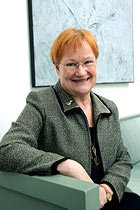 Tarja Halonen, Finland's first woman leader, beat off conservative challenger Sauli Niinisto with 51.8% of the votes in the presidential run-off election.
Tarja Halonen, Finland's first woman leader, beat off conservative challenger Sauli Niinisto with 51.8% of the votes in the presidential run-off election.Halonen's career started in the National Union of Finnish Students, where she worked as Social Affairs Secretary in 1969-70. She joined the Social Democratic party in 1971 and, three years later, she was appointed parliamentary secretary to the Prime Minister. She was elected to the Parliament in 1979 and held her seat in five consecutive elections until she assumed the office of the President of Finland in 2000. Tarja Halonen has also served in three cabinets and her appointments have been: Minister of Social Affairs and Health (1987-1990), Minister of Justice (1990-1991) and Minister for Foreign Affairs (1995-2000).
Tarja Halonen has always paid close attention to issues of human rights, democracy and civil society and issues concerning social justice and promotion of equality have been central themes throughout her political career. She has likewise long played an active role in the international solidarity movement.
The left-wing president had not won an outright majority in the first round, but has now won a second six-year term.
Aussie Open
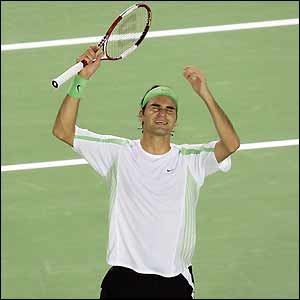
"I did focus for two sets but then there were moments that I started thinking too much. Maybe I was a bit scared of him and didn't really believe in it." This was how Marcos Baghdatis explained why he lost in the Australia Open men's final to Roger Federer. The 20-years old Cypriot is one of the major figures of the event, and one name that tennis fans will certainly get familiar with. But we shouldn't forget that Roger Federer was the one who won!
The Swiss ace, who took the 2005 Wimbledon and US Open titles, now only needs to win in Paris to hold all four Grand Slam titles simultaneously. Federer never won the French Open... but today received his trophy from Rod Laver, the last man to hold all four Grand Slams at the same time. Premonition? Maybe...
We are all so used to watch Federer win that we tend to underestimate his merit. But the truth is that although he is only 24, this was already his seventh Grand Slam win! Many predict that he will overhaul Pete Sampras' record of 14 triumphs.
Many were surprised by his tearful response to winning his third straight Grand Slam title. Roger Federer has a simple explanation: "I'm also just human".
Bicycle

"a two-wheeled vehicle which one rides by pushing its pedals with the feet"
Pedro challenged me and I accepted. We took our bikes, got on them and rode for half an hour until "Confeitaria Garcia", at Av. de la Couronne. We had a typical Portuguese brunch, stayed for a while, and then rode back home.
It wasn't the first time we went for a ride in Brussels, but it was the first time I rode my bike with such a low temperature. It was freezing and the cold air made it difficult to breathe. Still, it was nice. Brussels is a friendly city for riders and this is definitely a different way to get to know it. Something we should do more often.
Thursday, January 26, 2006
Palestinian's election - Part III
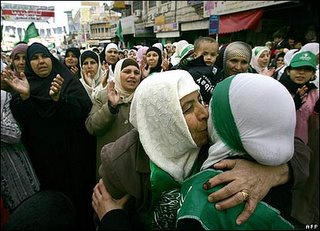
Preliminary results give Hamas 76 of the 132 seats in the chamber, with the ruling Fatah party trailing on 43. The win poses problems for efforts to restart peace talks with Israel, as the Jewish state insists it will not deal with an authority including Hamas, even though Mahmoud Abbas, head of the Fatah party and President of the Palestinian Authority, says he remains committed to a peaceful settlement.
US President George W Bush said the US would not deal with Hamas unless it renounced its call to destroy Israel. Which makes sense... but Amr Moussa, Secretary General of the Arab League, pointed very well that the US cannot promote democracy and then reject its results.
This is, of course, an entirely new situation, which will need to be carefully analysed. But the results should be respected; I have no doubts about it!
This is the moment of truth, and it concerns everyone: first of all the Palestinians themselves, who have made a choice and now have to meet the results of what they've chosen; Hamas, who has to decide between a path of democracy or a path of violence; Israel, who has difficult choices to make; the US, the EU, the whole of the international community.
I do hope that everyone is ready to make their part of the needed efforts in order to renounce to violence and agree to move forward according to the peace objectives that have been fixed. Inch'allah!
Palestinian's election - Part II
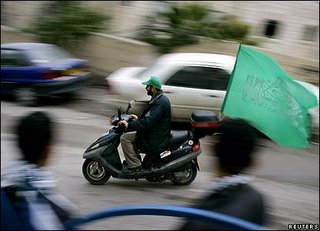 With counting still under way, officials from the ruling Fatah party said Hamas had won a majority. Official results are due later today, at 6.00pm, but Palestinian Prime Minister Ahmed Qurei has announced his resignation, saying Hamas must form the next government following the parliamentary elections. Hams claimed it had won at least 70 seats in the 132-member parliament.
With counting still under way, officials from the ruling Fatah party said Hamas had won a majority. Official results are due later today, at 6.00pm, but Palestinian Prime Minister Ahmed Qurei has announced his resignation, saying Hamas must form the next government following the parliamentary elections. Hams claimed it had won at least 70 seats in the 132-member parliament.Even though the final numbers may be different, there is no doubt that the Hamas showing has transformed the Palestinian political arena. For decades, Fatah has totally dominated electoral politics, but that time is over. Hamas is also now a major power and it will enter parliament still committed to its armed confrontation with Israel.
With victory looming, Hamas senior officials said the group wanted to work with Fatah in a "political partnership". But they also said Hamas would not hold peace talks with Israel.
On that point everyone seems to agree, since Israel and the US consider Hamas a terrorist group and have said they do not want to deal with it. The EU - the biggest provider of aid to the Palestinian Authority - was a bit more cautious, stating that it would work with any peaceful Palestinian government.
I don't subscribe the Isareli and US extremist points of view, and once again feel proud of being an European. Palestinians have voted and democratically elected a new government. I think we have to respect that. Now it's time to reiterate our call on all concerned parties to put human rights at the top of their agenda and to spare no effort to end the increasingly widespread lawlessness and violence.
Let's hope that, as it happens in so many cases all over the world, this electoral victory will make Hamas change. For better, of course.
Wednesday, January 25, 2006
Make Love (not war)
"“God is love, and he who abides in love abides in God, and God abides in him” (1 Jn 4:16). These words from the First Letter of John express with remarkable clarity the heart of the Christian faith: the Christian image of God and the resulting image of mankind and its destiny. In the same verse, Saint John also offers a kind of summary of the Christian life: “We have come to know and to believe in the love God has for us”.
We have come to believe in God's love: in these words the Christian can express the fundamental decision of his life. Being Christian is not the result of an ethical choice or a lofty idea, but the encounter with an event, a person, which gives life a new horizon and a decisive direction. Saint John's Gospel describes that event in these words: “God so loved the world that he gave his only Son, that whoever believes in him should ... have eternal life” (3:16). In acknowledging the centrality of love, Christian faith has retained the core of Israel's faith, while at the same time giving it new depth and breadth. The pious Jew prayed daily the words of the Book of Deuteronomy which expressed the heart of his existence: “Hear, O Israel: the Lord our God is one Lord, and you shall love the Lord your God with all your heart, and with all your soul and with all your might” (6:4-5). Jesus united into a single precept this commandment of love for God and the commandment of love for neighbour found in the Book of Leviticus: “You shall love your neighbour as yourself” (19:18; cf. Mk 12:29-31). Since God has first loved us (cf. 1 Jn 4:10), love is now no longer a mere “command”; it is the response to the gift of love with which God draws near to us.
In a world where the name of God is sometimes associated with vengeance or even a duty of hatred and violence, this message is both timely and significant. For this reason, I wish in my first Encyclical to speak of the love which God lavishes upon us and which we in turn must share with others. That, in essence, is what the two main parts of this Letter are about, and they are profoundly interconnected. The first part is more speculative, since I wanted here—at the beginning of my Pontificate—to clarify some essential facts concerning the love which God mysteriously and gratuitously offers to man, together with the intrinsic link between that Love and the reality of human love. The second part is more concrete, since it treats the ecclesial exercise of the commandment of love of neighbour. The argument has vast implications, but a lengthy treatment would go beyond the scope of the present Encyclical. I wish to emphasize some basic elements, so as to call forth in the world renewed energy and commitment in the human response to God's love."
Introduction to the Encyclical Letter Deus Caritas Est of the Supreme Pontiff Benedict XVI.
We have come to believe in God's love: in these words the Christian can express the fundamental decision of his life. Being Christian is not the result of an ethical choice or a lofty idea, but the encounter with an event, a person, which gives life a new horizon and a decisive direction. Saint John's Gospel describes that event in these words: “God so loved the world that he gave his only Son, that whoever believes in him should ... have eternal life” (3:16). In acknowledging the centrality of love, Christian faith has retained the core of Israel's faith, while at the same time giving it new depth and breadth. The pious Jew prayed daily the words of the Book of Deuteronomy which expressed the heart of his existence: “Hear, O Israel: the Lord our God is one Lord, and you shall love the Lord your God with all your heart, and with all your soul and with all your might” (6:4-5). Jesus united into a single precept this commandment of love for God and the commandment of love for neighbour found in the Book of Leviticus: “You shall love your neighbour as yourself” (19:18; cf. Mk 12:29-31). Since God has first loved us (cf. 1 Jn 4:10), love is now no longer a mere “command”; it is the response to the gift of love with which God draws near to us.
In a world where the name of God is sometimes associated with vengeance or even a duty of hatred and violence, this message is both timely and significant. For this reason, I wish in my first Encyclical to speak of the love which God lavishes upon us and which we in turn must share with others. That, in essence, is what the two main parts of this Letter are about, and they are profoundly interconnected. The first part is more speculative, since I wanted here—at the beginning of my Pontificate—to clarify some essential facts concerning the love which God mysteriously and gratuitously offers to man, together with the intrinsic link between that Love and the reality of human love. The second part is more concrete, since it treats the ecclesial exercise of the commandment of love of neighbour. The argument has vast implications, but a lengthy treatment would go beyond the scope of the present Encyclical. I wish to emphasize some basic elements, so as to call forth in the world renewed energy and commitment in the human response to God's love."
Introduction to the Encyclical Letter Deus Caritas Est of the Supreme Pontiff Benedict XVI.
Palestinian's election
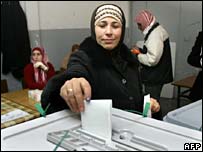 Palestinians are voting in their first parliamentary election for a decade, with the governing Fatah party facing a strong challenge.
Palestinians are voting in their first parliamentary election for a decade, with the governing Fatah party facing a strong challenge.In 1996 Fatah, the faction at the heart of the PLO that was created and led by Yasser Arafat, won an overwhelming victory in the first elections for the Palestinian Legislative Council. The difference then was that Hamas, the Islamist movement, did not stand. This time it is contesting the elections, and opinion polls put it neck and neck with Fatah.
Palestinians want a change. There is not much about their lives that is changeable - after all, they have lived under an Israeli military occupation since 1967 - but 10 years after they first elected a legislature they are voting again, and all the signs are that they want their votes to count.
Part of the reason why Hamas is popular is what Palestinians call the "armed struggle" against Israel. But the main reasons why they want to vote for it lie in the failure over the last 10 years of Fatah - and that includes Arafat and his successor Mahmoud Abbas - to create efficient, honest and strong government. Years of corruption have been made even worse by the increasing lawlessness on the streets of Gaza and parts of the West Bank. Hamas is seen as honest and efficient. Palestinians who once believed that supporting Fatah was a national duty are in the modd to teach it a lesson.
If Palestinians vote in numbers for Hamas, it will have a new, stronger, different kind of legitimacy. It will be harder than ever to ignore. The entry of Hamas in democratic politics creates many new questions in a region that was already full of them: secular Palestinians - and Christians - are nervous about its Islamist agenda; Israelis will have to decide whether they want to talk to the Palestinian Authority if it includes an organisation that has killed hundreds of its civilians; moreover, a strong showing by Hamas could push Israelis to the right when they vote in their general election in March; the US and the EU have both condemned Hamas as a terrorist group and they will need to respond if Hamas leaders join the Palestinian cabinet.
Challenges and dangers always lie ahead in the Middle East. But there could be some new opportunities as well. Polls are set to close at 6.00pm (CET).
Tuesday, January 24, 2006
Freeze!
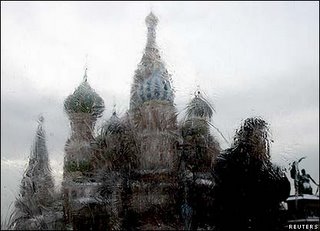 Freezing weather continues to affect much of central and eastern Europe, including Moscow, where St Basil's Cathedral is here seen through an iced-up window. In Brussels, we have been experiencing some sunny days and even though it's cold... it's been much better than in some other regions in Europe. Still, I have the impression that I am, for the first time in my life, living what we can call a real winter time.
Freezing weather continues to affect much of central and eastern Europe, including Moscow, where St Basil's Cathedral is here seen through an iced-up window. In Brussels, we have been experiencing some sunny days and even though it's cold... it's been much better than in some other regions in Europe. Still, I have the impression that I am, for the first time in my life, living what we can call a real winter time.
Growing-up
Someone I love very much just told me that "the worst thing of growing-up is that we start experiencing death"... I had never thought of it, but it is true. When we are children, we are protected, kept away from death; when we grow-up, however, nobody protects us anymore: we have to face death in the eyes... and be strong.
Bob Dylan once wrote a song called "Death Is Not The End". I don't know - and I don't even feel like knowing - what he was trying to say with those lyrics. For believers, this might have a spiritual meaning, remembering them about life after death; for me, it is kind of obvious: having seen the pain and the suffering in the eyes of so many people left alone by the sudden departure of someone they loved, it is impossible to believe death to be the end.
No, death is not the end; death is absence. Deep and overwhelming absence.
Bob Dylan once wrote a song called "Death Is Not The End". I don't know - and I don't even feel like knowing - what he was trying to say with those lyrics. For believers, this might have a spiritual meaning, remembering them about life after death; for me, it is kind of obvious: having seen the pain and the suffering in the eyes of so many people left alone by the sudden departure of someone they loved, it is impossible to believe death to be the end.
No, death is not the end; death is absence. Deep and overwhelming absence.
Free Belarus!
"Further to the difficulties the Belarusian Union of Youth and Children’s Public Association ( RADA ) has faced over the past months, the European Youth Forum (YFJ) is outraged to learn that the Ministry of Justice of the Republic of Belarus has issued a writ against RADA , pursuant to their liquidation.
The writ issued by the Ministry contains various accusations against RADA , relating to work justifiably undertaken by a National Youth Council, and reflecting the sustained opposition that the Government has exhibited against the organisation.
The Ministry of Justice continues to claim that RADA ’s policies interfere with the internal affairs of official state structures; emphasising, in particular, their belief that RADA promotes subversive ideas of alternative youth policy and the possibilities for the introduction of a European model of youth policy to Belarus.
A High Court hearing will be held on 28 January, and the European Youth Forum is extending its full support to RADA , embarking on a campaign to raise awareness of the serious situation facing RADA and to put pressure on the Government of Belarus to end their opposition to RADA and to the development of a strong and independent youth sector in the Republic.
We call on all Member Organisations of the YFJ to support RADA , a full member of the Forum since 2000, and to use all the resources at their disposal to join this campaign and initiate independent actions to protest against this situation and bring an end to the difficulties facing their colleagues in Belarus."
The writ issued by the Ministry contains various accusations against RADA , relating to work justifiably undertaken by a National Youth Council, and reflecting the sustained opposition that the Government has exhibited against the organisation.
The Ministry of Justice continues to claim that RADA ’s policies interfere with the internal affairs of official state structures; emphasising, in particular, their belief that RADA promotes subversive ideas of alternative youth policy and the possibilities for the introduction of a European model of youth policy to Belarus.
A High Court hearing will be held on 28 January, and the European Youth Forum is extending its full support to RADA , embarking on a campaign to raise awareness of the serious situation facing RADA and to put pressure on the Government of Belarus to end their opposition to RADA and to the development of a strong and independent youth sector in the Republic.
We call on all Member Organisations of the YFJ to support RADA , a full member of the Forum since 2000, and to use all the resources at their disposal to join this campaign and initiate independent actions to protest against this situation and bring an end to the difficulties facing their colleagues in Belarus."
Monday, January 23, 2006
Pachakutic
That's the word in Quechua (the language of the indigenous people of Andean mountains) for a change in the sun, a movement of the Earth which will bring a new era. An indigenous Indian has been elected president of Bolivia for the first time and the people of Chile have elected their first-ever woman president. Many people see a new cycle beginning.
Evo Morales and Michelle Bachelet join Lula, the ex-steel worker who leads Brazil, and Hugo Chavez, who runs Venezuela. They are all part of a new breed of leaders who, to say the least, look different. The era of the conservative middle-aged man in a grey suit, representing the white-skinned landed elite across Latin America appears to be coming to an end.
Latin America's political map could keep being redrawn as many of the region's countries prepare for presidential elections until the end of this year. One of the key issues is whether the recent left-wing trend in the region will continue; and, if it does, what will be the likely nature of any new left-leaning government: radical as Hugo Chavez or moderate as Lula da Silva?
The next round will be played in two weeks, in Costa Rica. Former President Oscar Arias, who served from 1986 to 1990, is hoping to return to power with his National Liberation Party (socialist) and end the rule of the centre-right Social Christian Unity Party. Recent opinion polls suggest that Mr Arias is ahead.
Evo Morales and Michelle Bachelet join Lula, the ex-steel worker who leads Brazil, and Hugo Chavez, who runs Venezuela. They are all part of a new breed of leaders who, to say the least, look different. The era of the conservative middle-aged man in a grey suit, representing the white-skinned landed elite across Latin America appears to be coming to an end.
Latin America's political map could keep being redrawn as many of the region's countries prepare for presidential elections until the end of this year. One of the key issues is whether the recent left-wing trend in the region will continue; and, if it does, what will be the likely nature of any new left-leaning government: radical as Hugo Chavez or moderate as Lula da Silva?
The next round will be played in two weeks, in Costa Rica. Former President Oscar Arias, who served from 1986 to 1990, is hoping to return to power with his National Liberation Party (socialist) and end the rule of the centre-right Social Christian Unity Party. Recent opinion polls suggest that Mr Arias is ahead.
Sunday, January 22, 2006
I think I'll move to South America
 At the same time that Portugal's worst nightmare came true, Evo Morales has been sworn in as Bolivia's first indigenous president, pledging to end 500 years of injustice against his people. To emphasize this pledge, yesterday he went to the archaeological remains of the Tiwanaku civilisation and made a private offering to Pachamama at the Inca temple of Kalasasaya. There, barefoot and dressed as a sun priest, he received the baton that will symbolise his Indian leadership. (in the photo, an Aymara Indian holds a flag from the old Inca empire during spiritual ceremonies on the eve of the inauguration as Bolivian president of Evo Morales)
At the same time that Portugal's worst nightmare came true, Evo Morales has been sworn in as Bolivia's first indigenous president, pledging to end 500 years of injustice against his people. To emphasize this pledge, yesterday he went to the archaeological remains of the Tiwanaku civilisation and made a private offering to Pachamama at the Inca temple of Kalasasaya. There, barefoot and dressed as a sun priest, he received the baton that will symbolise his Indian leadership. (in the photo, an Aymara Indian holds a flag from the old Inca empire during spiritual ceremonies on the eve of the inauguration as Bolivian president of Evo Morales)
Oh Portugal, Portugal...
There's nothing left to say... Conservative Anibal Cavaco Silva won the Portuguese Presidential elections... I went for my CDs and I'm now listening to the saddest song I've got...
Tuesday, January 17, 2006
Politics as History

There are thousands of words to describe this victory and many of them have already been used; the pictures of Michelle Bachelet addressing thousands of supporters smiling and carrying flags all over Santiago, are however the best description of this moment of happiness! Because, today, the words aren't the ones that matter; but the emotion, the hugs and the joy of all those who shared the dream, the possible dream of a more just country, where a woman who was once a victim of hate, is today the elected President of Chile! History was made... but more History is about to begin!
Monday, January 16, 2006
Desperate House Husband
Well, technically, being divorced, I'm not a husband; but I definitely feel desperate! It's amazing the amount of time and effort it takes to keep a house... I don't even dare to say clean... only habitable!
When I was younger, I had the feeling that my mother was always cleaning the house and I found it a bit paranoiac... now, I see it differently and I must confess I understand her. And, of course, I will never tell jokes about the easy life of housewives again...
Housework is hard and, when you live on your own, is eventually unavoidable... because it doesn't matter if you use it or not: a house will get dirty even if you don't live there! Isn't this unfair?!
Sometimes, I regret to have rent what, in these occasions, seems to be a huge apartment!
When I was younger, I had the feeling that my mother was always cleaning the house and I found it a bit paranoiac... now, I see it differently and I must confess I understand her. And, of course, I will never tell jokes about the easy life of housewives again...
Housework is hard and, when you live on your own, is eventually unavoidable... because it doesn't matter if you use it or not: a house will get dirty even if you don't live there! Isn't this unfair?!
Sometimes, I regret to have rent what, in these occasions, seems to be a huge apartment!
A long, long time ago...
It's been almost four months since my last post... In the meantime, autumn came and gone, I turned 31, visited many countries, spent Christmas in Portugal and one new year started. And, of course, many, many things happened... As it would be impossible to write about all these four months, I decided to ignore this period of time and start all over again.



